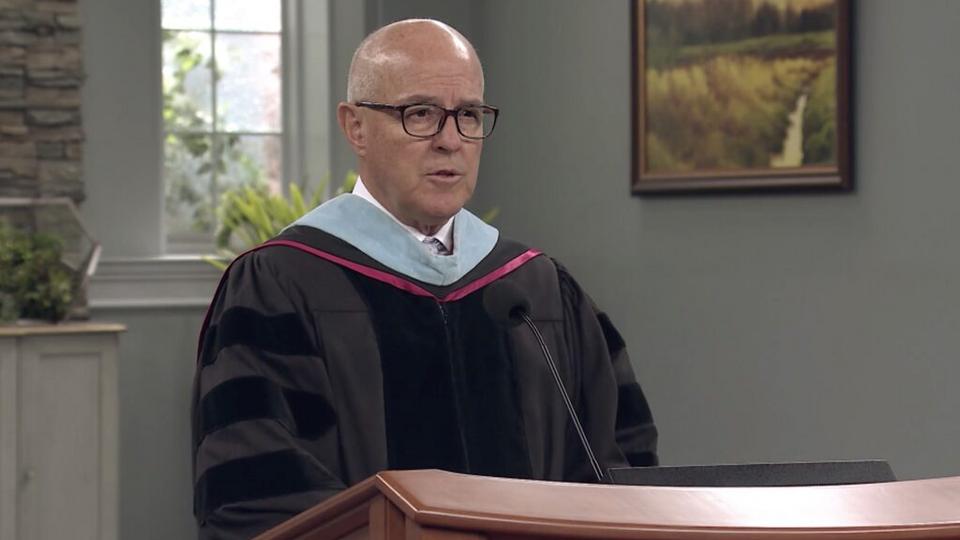
Clayton BYU-I Commencement 1
Elder L. Whitney Clayton, senior president of the Quorum of the Seventy, speaks during spring commencement services broadcast to BYU–Idaho graduates on July 22, 2020. Photo by BYU–Idaho, courtesy of Church News. All rights reserved.This story appears here courtesy of TheChurchNews.com. It is not for use by other media.
By Rachel Sterzer Gibson, Church News
Many uncertainties face today’s graduates as they prepare to “cross the threshold” into the world, acknowledged Elder L. Whitney Clayton.
“The COVID-19 pandemic has probably changed your immediate prospects in ways that may not yet even be apparent,” the senior president of the Quorum of the Seventy said during his commencement address to graduates of Brigham Young University–Idaho (BYU–Idaho) on Wednesday, July 22. “The employment marketplace has shifted dramatically. Unemployment has become a much larger problem than it was just a few months ago.”
Unprecedented government-imposed lockdowns, major disruptions to travel and business practices, social upheavals, riots and accusations of discrimination all fill the news while social distancing has changed nations, cities, supermarkets and Church services, he said.
However, Elder Clayton assured the graduates that they will have seasons of health, prosperity and joy, as well as problems — big and small — throughout their lives. “You will prosper ‘according to the heed and diligence which [you] give unto [the Lord]’ as you seek the promised land (Alma 37:16). Your joy will come from Him who is the source of joy, our Eternal Father in Heaven.”
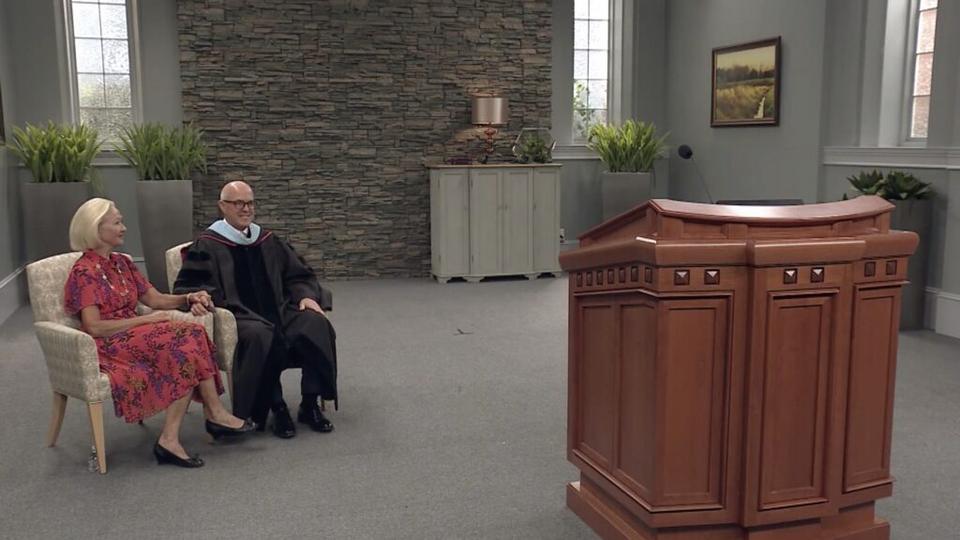
Clayton BYU-I Commencement 3
Elder L. Whitney Clayton, senior president of the Quorum of the Seventy, sits with his wife, Sister Kathy Clayton, prior to speaking during spring commencement services broadcast to BYU–Idaho graduates on July 22, 2020. Photo by BYU–Idaho, courtesy of Church News. All rights reserved.Elder Clayton addressed the 2,558 graduates in an online commencement service for those whose last semester was disrupted by COVID-19. After face-to-face classes were canceled at BYU–Idaho beginning March 15, it was announced all spring 2020 classes would be held online and remotely. BYU–Idaho encouraged its graduates, wherever they were located, to tune into the commencement service virtually — and “to gather with their families, celebrate, take pictures, and share in their achievement.”
To those graduates, Elder Clayton noted: “The world may not seem the same to you now as it did on January 1, or even on March 1. Things change, and sometimes they change fast.”
While the past year shows change can happen quickly, history teaches that the world has always been unstable and unpredictable, Elder Clayton said. “The 20th century began with horses and buggies and ended with astronauts walking on the moon and living in space stations. Vaccinations later in the century prevented the infection of countless people with dreaded diseases, but a virulent flu pandemic still killed millions early in the century. Two world wars killed tens of millions more. A depression in the 1930s brought the entire world to its economic knees. New diseases like AIDS, Ebola, and COVID-19 filled the voids left by diseases that were cured.”
But while change is certain, the central issues of life continue “year after year, decade after decade, and century after century,” Elder Clayton said.
Across the globe, people marry, raise children and worry about where to live, how to feed and protect their families, and how to stay safe and healthy. “They hope to be happy and to be loved. … At root, we worry today about basically the same kinds of things our grandparents did, and their grandparents did,” he said.
Just as the basic issues of life don’t change, neither do the keys for successful living, Elder Clayton continued. “They are constant. Prophets anciently taught the truths that if applied will bring joy in this life whatever our immediate circumstances may be. Prophets today do the same thing. Their promises come from God. They are perfectly designed by Him, our loving Father in Heaven, to deliver to all who choose to follow Him a soul-satisfying and joyful pathway through life regardless of the immediate challenges we may encounter.”
Elder Clayton invited his listeners to consider the promised land accounts of Moses and the children of Israel, Lehi and Sariah and their family, and the pioneers. Each group is led by prophetic guidance and shows examples of joy and of suffering, he explained. “In all three we see a promised land beckoning in the distance and a pathway to that destination that required faithful obedience and hard work … and that new challenges and opportunities would come to those who had just arrived in those promised lands.”
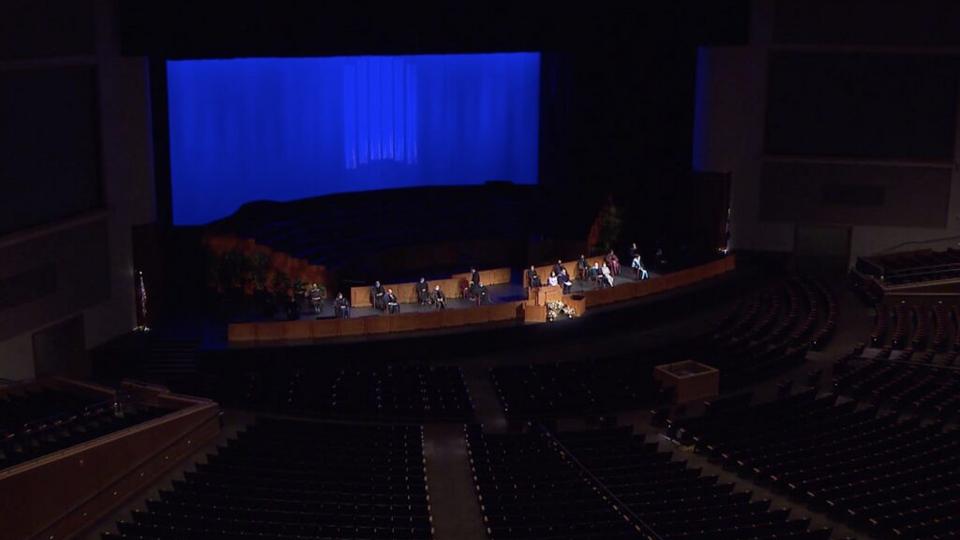
Clayton BYU-I Commencement 4
Church and university leaders sit on the stand in the empty BYU–Idaho Center for spring commencement services on July 22, 2020. The ceremony was broadcast to graduates. Photo by BYU–Idaho, courtesy of Church News.All rights reserved.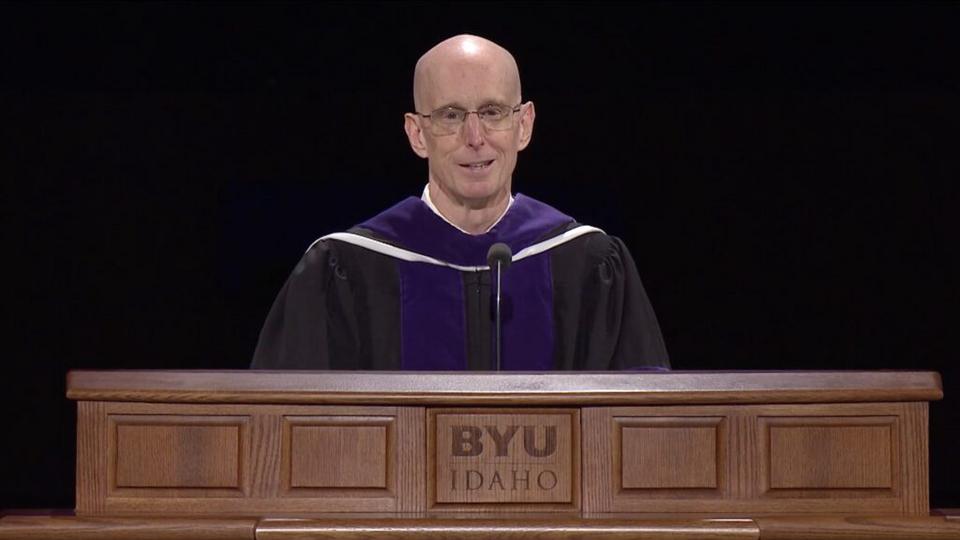
Clayton BYU-I Commencement 5
BYU–Idaho President Henry J. Eyring speaks during spring commencement ceremony on July 22, 2020. Photo by BYU–Idaho, courtesy of Church News. All rights reserved.The promised lands pattern can be applied today, Elder Clayton continued. “We follow a trail through life marked by prophetic guideposts. When we stay on that prophetic or covenant path we are sustained in our trials along the trail. We reach lands of happiness and abundance, and then we turn to new challenges and opportunities, and new promised lands. We see that things work out if we choose to follow the Lord and His prophets.”
Lehi’s family had the benefit of the Liahona, he said, which acted as a compass to guide them both physically and spiritually. The prophet Alma later explained that when they were slothful, they did not progress on their journey and they did not prosper (see Alma 37:40-44).
To be slothful, or spiritually sleepy, is a temptation that catches too many in its quiet, unobtrusive trap today, Elder Clayton said. “Picking the least demanding course among commandments and teachings, they fail to give heed to the compass of the covenant path and do not travel in the direct path outlined by prophets.”
Instead of progressing toward the promised land, they make their way toward other seemingly attractive destinations and turn toward the doctrines and philosophies of men. “You may very likely have met some of these sojourners, perhaps even a few here at Brigham Young University–Idaho,” Elder Clayton said.
The opposite of sloth is actively pursuing the path leading to “peace in this world, and eternal life in the world to come” by obeying the first two commandments: “Love the Lord thy God with all thy heart, and with all thy soul, and with all thy mind” and to “love thy neighbor as thyself” (Matthew 22:37, 39).
“Think what the entire world would be like overnight if men and women kept those two basic commandments,” Elder Clayton said. “Imagine what your marriages, families and homes will be like as you choose to obey the first two commandments and to make doing so the essence of your lives. These two commandments merge when we love God by serving our neighbor.”
The blessings of heaven and joy, which together constitute a promised land, are available to all who seek to please God by keeping His commandments, Elder Clayton said. “Those blessings and that joy are within your reach. … Faith and daily determination to stay on the covenant path are required for the journey. You will be blessed and helped and supported along the way and all the while.”
Elder Paul V. Johnson, General Authority Seventy and commissioner of education for the Church, noted that graduates are walking into a very different world than the one that existed when they entered the university.
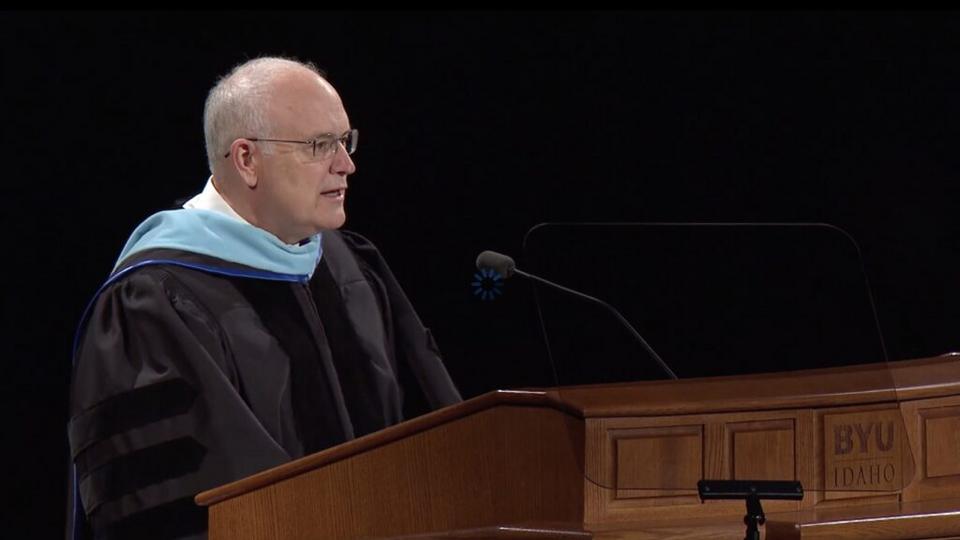
Clayton BYU-I Commencement 2
Elder Paul V. Johnson speaks to BYU–Idaho graduates during commencement services on July 22, 2020. Photo by BYU–Idaho, courtesy of Church News.All rights reserved.“How do you deal with the momentous changes?” he asked.
“Your future is not determined by the conditions around you or the changes in the world. Your future is determined by your faith, your choices and your efforts. Not because your faith and choices will eliminate either global or personal pandemics, but because they will allow the Lord to be close to you and to help you. If you keep your covenants, you will have access to the inspiration and power you need to triumph over any challenge with which you are faced.”
Copyright 2020 Deseret News Publishing Company